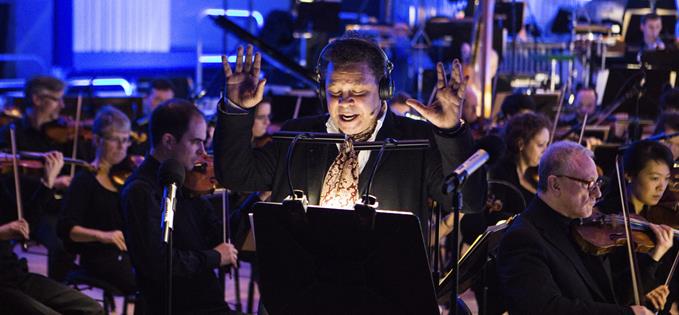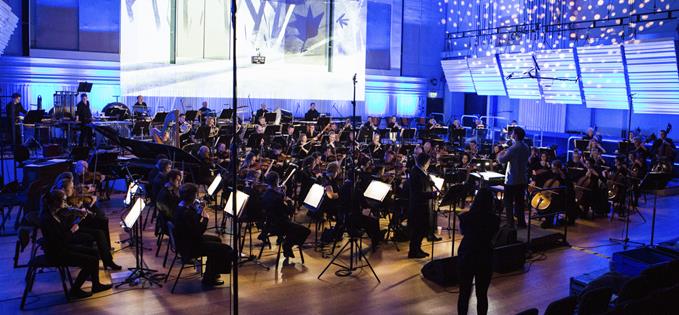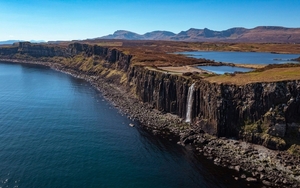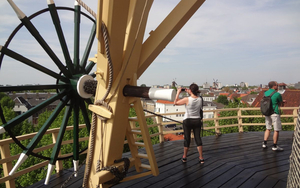AUSTERITY Britain, Brexit, an eternal winter... Craig Charles’ version of Hansel & Gretel is more akin to Grimm’s original story than the twee Disneyfication that followed. Dark and gothic, it’s the second instalment in Craig’s fascinating Scary Fairy project - following 2015’s Red Riding Hood - in which popular fairytales are turned to rhyme and given modern 21st century references.
For the orchestra it’s like shelling peas. The first time they played it, it was already like they’d been performing it for a thousand years...amazing
With each poem recorded for BBC Radio 2’s Friday Night is Music Night, accompanied by a unique score from the BBC Philharmonic, Confidential went down to see Hansel & Gretel being produced in MediaCity. Due to be broadcast on Friday 6 January, the evening saw the local orchestra perform some of the fairytale genre’s most familiar tunes - from When You Wish Upon a Star to Steps of the Palace, accompanied by phenomenal singers James Shovelton and Hannah Waddingham - before Craig took over the second half with his witty stanzas.
There may have been a happy ending but it was a close shave for Hansel and his sister, until heroine Scary Fairy came to the rescue - passing the likes of Baa Baa Black Sheep and a crumb-stuffed robin on the way. Clever and comical, with dark undertones and compulsive rhyme throughout, it was made all the more dynamic by the specially-commissioned orchestral score: a true treat for the ears.
We caught up with Craig - whose other creative pursuits include Red Dwarf actor, funk and soul DJ and Glastonbury regular - to find out more about the inspiration behind Scary Fairy, how the BBC collaboration came about and what’s next for the intriguing project.
Hi Craig, listening to Scary Fairy was fascinating: it’s a very clever piece. What was the inspiration behind it?
Craig: "Thanks, glad you enjoyed it. It came about as a bedtime poem about ten years ago, when my daughter was three or four. It wasn’t something I did regularly, and it tailed off once the children learned to read themselves, but a couple of years ago Nellie suddenly said, “Dad, do you remember that story you used to tell us with all the rhymes? It was brilliant, why don’t you do something with it?
"So we found it and I spent a few days polishing and modernising. I wanted it to appeal to adults, as well as kids; particularly because it got progressively darker as mine grew older. After I’d tidied it into a performance piece, I went to the BBC and asked if they would consider it as an event. I’ve done a lot of things with them for 6 Music and Radio 2 so we’ve got a great relationship...although when I said I wanted to take over Friday’s Music Night for a Halloween special and borrow their orchestra too (for Red Riding Hood, the first instalment, in October 2015) they were a bit sceptical! But they agreed eventually and it worked well: we’re planning on doing one every year now, there should be five more after Hansel & Gretel."
The music was fantastic too. How does the BBC Philharmonic go about developing the Scary Fairy scores?
CC: "When we first decided to go ahead with the project, the orchestra manager, Simon Webb, put me in touch with the composer Iain Farrington and we talked about the direction we’d take with it. I wanted each character to have their own theme tune and, since all the Scary Fairy stories contain references to several different fairytales, the music to reflect that too. After that they didn’t need my input really, they were doing a great job on their own."
Were you taking cues on the night? I was impressed there weren’t any slip ups!
CC: "Well for the orchestra it’s like shelling peas. The first time they played it, it was already like they’d been performing it for a thousand years...amazing. Although I wrote the piece, I’m ironically the only one who can’t read music! As with Ben Gernon in Red Riding Hood, Clark Rundell the conductor treated me like a soloist really. He was conducting with his baton and, every now and again, he’d give me a little wink so I knew to start speaking or shake his head for me to stop. Talk about multitasking."
How many rehearsals did you do beforehand?
CC: "The piece is so long, it’s difficult to rehearse. When we were doing Red Riding Hood, I did two performances on the day before, which was actually the first time the orchestra had seen it. Then we did one in the afternoon before the evening performance, so three times altogether.
"For Hansel & Gretel, because it’s all a bit more familiar, we only did one afternoon rehearsal before going live in the evening."

CC: "I started writing poetry really young, it was the only thing I was good at in school. After that I did Wogan and Saturday Night Live so it was how I became famous really. Then the producer, Paul Jackson, took me off to do Red Dwarf so I got a bit sidetracked! But yes, it’s something I’ve always continued."
And Red Dwarf has been a roaring success...
CC: "That was my first ever acting job. I was a performance poet, Chris was an impressionist, Robert was in some dodgy comedy troop, Danny was a dancer... so none of us were actors but luckily it worked. I realised I wanted to get back to it in 2014 when my brother died. It made me reflect on what I really wanted and that was to return to Red Dwarf, poetry, things like that. And concentrate on my music as well; particularly funk and soul."
You’ve taken on so many art forms: comedy, acting, poetry, music... Is there one you’re most proud of?
CC: "I couldn’t choose really. I’ve been playing Dave Lister in Red Dwarf for almost 30 years and I think he’s a great creation. But I enjoyed playing Lloyd the Corrie cabbie for ten years as well. I think different parts suit different stages in your life. I loved Takeshi’s Castle too: we just used to go out and have a few pints, then come back, stick in the VHS and pick up the microphone. There was no script or anything, we just said what we saw. It was like an older version of Gogglebox I suppose, great fun."

CC: "Yes I suppose I have. I remember doing the first Robot Wars: none of the robots would work, they had to pull them with invisible twine, and I was looking in my dressing room mirror thinking ‘what am I doing?' And Red Dwarf was such a random concept that most people wouldn’t touch it with a bargepole. Then Takeshi’s Castle was this defunct, obsolete series from Japan which no one ever won... So I’ve been lucky in that respect. But the choices were both accidental and deliberate: I’ve always been interested in that kind of subversive stuff."
Finally, what’s next for Scary Fairy?
CC: "Well Mackinnon and Saunders (Altrincham-based puppeteers) have the soundtrack and poems, and the plan is to turn each of the seven instalments into 30-minute stop motion movies. These guys have worked on things like Frankenweenie and Corpse Bride so it’s really exciting. Currently I’m working on Snow White, which will be the next recording. So far I’ve done two winter tales but I think this will be a summer piece."
Catch Scary Fairy: Hansel & Gretel on BBC Radio 2, Friday 6 January at 8pm











